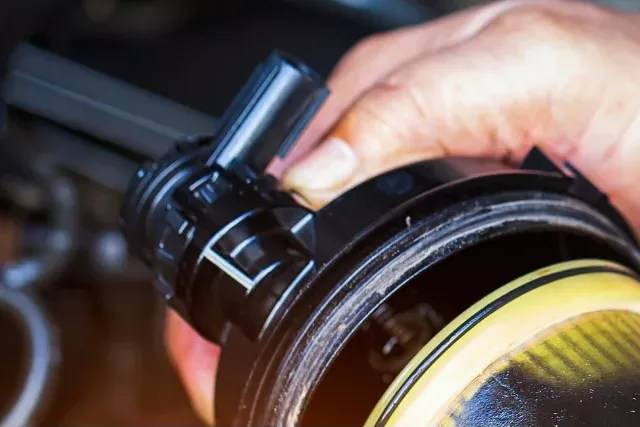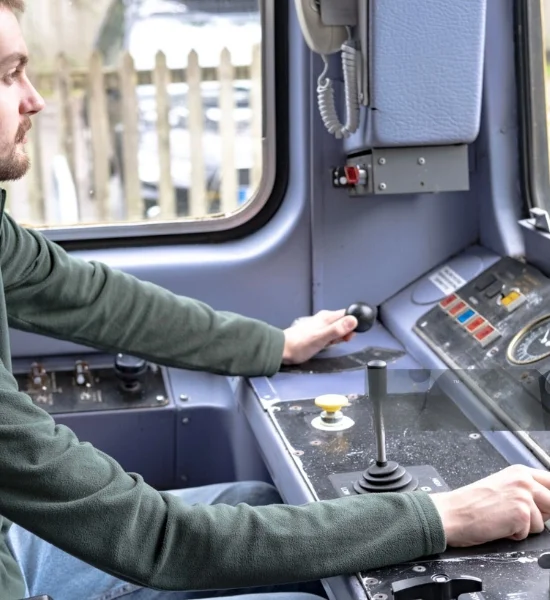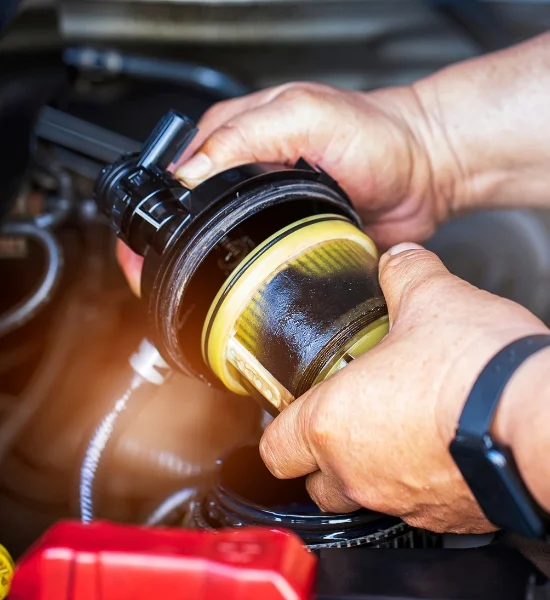
Train or locomotive engineers drive trains from one place to another. The trains they run are for private or government railroad businesses. Their work schedule differs from the standard norm. Some days are off, while sometimes they need to work on holidays and even do night shifts. The average salary of a train engineer is between $ 50,122 to $97,180 yearly. You must have completed an engineer training program to start your journey in this domain. Keep reading as we explain exactly how to make this job your career.
Read Also: Best Fuel Injector Cleaners for High Mileage
What Is The Process To Become A Train Engineer?
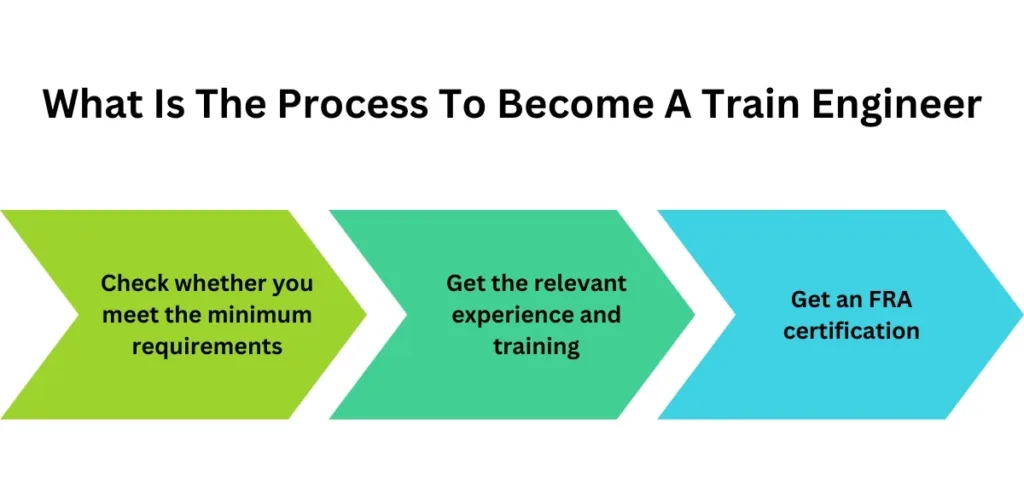
The most successful trained engineers are those with considerable on-the-job training. Here’s a general process to step into this career.
1. Check whether you meet the minimum requirements
Before going ahead and applying for a job, you must check whether you meet the basic needs of this role. You should be at least 21 years old with a high school diploma. Besides, you must be physically fit with good stamina, hearing, sharp vision, and hand-eye coordination.
2. Get the relevant experience and training
You cannot become a train engineer just after your high school education. These professionals are required to have extensive experience and hone their skills through on-the-job training. To acquire both these things, apply for an entry-level position at private railroad businesses or agencies. In these roles, you’ll be involved in activities like operating switches and uncoupling and coupling train cars. This position will also strengthen your communication skills as you will be regularly speaking with other professionals. Your aim should be to spend some time as a train conductor so you can advance to the position of a train engineer.
3. Get an FRA certification
To become a train engineer, you must get certified by the Federal Railroad Administration (FRA). It is a reflection of you fulfilling the required standards. Also, this certification that you can handle locomotive travel safely. The FRA certification is obtained after completing on-the-job training. Several railroad agencies provide federally approved training sessions. In them, you will learn how to operate trains and equipment. You will acquire an understanding of the safety regulations and weather navigation. After the training, you can apply for an FRA license. You will need to take an exam evaluating your skills and knowledge to get it.
Skills You Need To Become A Successful Train Engineer
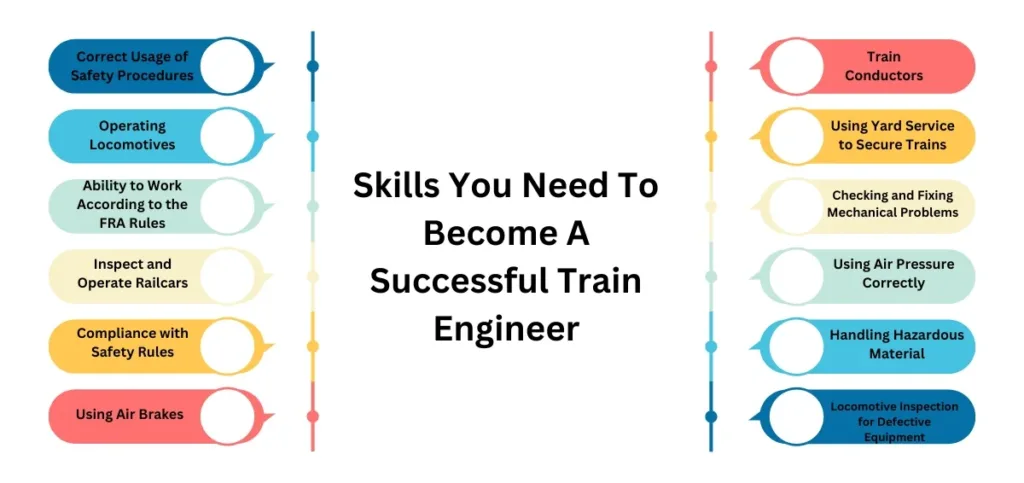
Train engineers are required to possess several skills to perform their jobs effectively. These include the following:
1. Correct Usage of Safety Procedures
Safety procedures are regulations protecting equipment and workers from harm. Train engineers must know how to use safety procedures to respond to breakdowns, emergencies, and weather conditions. They must also know how to supervise subordinates to ensure the fulfillment of suitable operational and safety procedures.
2. Operating Locomotives
Train engineers must know how to operate diesel-electric locomotives to transfer freight between stations. They must adhere to the safety regulations and time schedules while operating these locomotives.
3. Ability to Work According to the FRA Rules
Every efficient locomotive engineer uses the FRA rules to work properly. These rules are applied by them to inspect and test rides and give performance reviews of other engineers.
4. Inspect and Operate Railcars
Railcars carry materials on railroads. Train engineers should know how to examine these vehicles. It ensures their safety and transport. They must also know how to classify inbound trains as well as secure rail cars.
5. Train Conductors
Train engineers use conductors to check their copy of verbal track authority. They communicate with them over the radio. This lets them gather relevant data or learn about a problem resulting in delays or stops.
6. Compliance with Safety Rules
Train engineers have extensive knowledge of safety procedures. This is crucial to prevent accidents. They use safety procedures to comply with federal and company safety regulations for the safe operation of trains.
7. Using Air Brakes
Air brakes are used to control the train movement. Air brakes are also used by them to test the braking system of a train before it embarks on its journey.
8. Using Yard Service to Secure Trains
Train engineers move locomotives between the tracks so the trains are on schedule. They also report the arrival and departure times of the trains, any delays, and work order completion.
9. Checking and Fixing Mechanical Problems
Mechanical issues are common in equipment. Train engineers resolve these problems by monitoring machinery issues and getting them repaired timely.
10. Using Air Pressure Correctly
Locomotive engineers use air pressure to assess meters that map speed. The air pressure is used to assess amperage, battery charge, and pressure in brake lines and reservoirs.
11. Handling Hazardous Materials
Train engineers use their knowledge to handle hazardous materials that pose a risk to people and the environment to prevent accidents.
12. Locomotive Inspection for Defective Equipment
After using their locomotives, the train engineer inspects for any piece of defective equipment. They report it to prevent any chances of accidents.
Frequently Asked Questions

What is the highest salary for a train engineer?
The highest annual salary of a train engineer is $179,000. The maximum hourly wage is $86.
Are train engineers in high demand?
Yes, the growth rate of the train engineer job is 4% from 2018 to 2028. It is predicted that nearly 3,100 more jobs for train engineers will emerge in the next decade.
How many hours a week does a train engineer work?
On average, a train engineer works 40 hours per week. Many work irregular hours and can be on a call for 24 hours, all seven days of the week.
How long does it take to be a train engineer?
Rising to the level of a train engineer takes around 5 years. You need to first work as a conductor for several years and then spend six months in training. Only after that do you gain the certification of an engineer.
Read Also: Best High Paying Jobs
Summing Up
To become a trained engineer, you must possess the relevant experience and training. From operating locomotives to ensuring safety and regulatory compliance, a train engineer’s role in transportation is critical. Successful professionals are dedicated to their jobs and enjoy competitive salaries. The job is quite rewarding and gives ample opportunities for professional growth.






